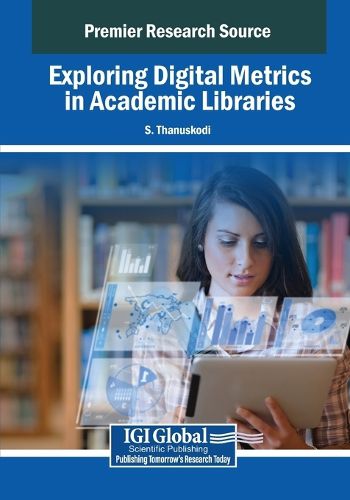Readings Newsletter
Become a Readings Member to make your shopping experience even easier.
Sign in or sign up for free!
You’re not far away from qualifying for FREE standard shipping within Australia
You’ve qualified for FREE standard shipping within Australia
The cart is loading…






This title is printed to order. This book may have been self-published. If so, we cannot guarantee the quality of the content. In the main most books will have gone through the editing process however some may not. We therefore suggest that you be aware of this before ordering this book. If in doubt check either the author or publisher’s details as we are unable to accept any returns unless they are faulty. Please contact us if you have any questions.
As academic libraries evolve in the digital age, the need for effective data collection and analysis has become increasingly important in assessing their impact and enhancing their services. Exploring digital metrics in academic libraries involves leveraging technology to track and measure a variety of activities, from resource usage and user engagement to the effectiveness of digital collections and services. These metrics provide valuable insights into how students, faculty, and researchers interact with library resources, enabling libraries to make data-driven decisions that improve access, support learning, and optimize operations. By embracing digital metrics, academic libraries can not only demonstrate their value to stakeholders but also adapt to the changing needs of the academic community in an increasingly digital world. Exploring Digital Metrics in Academic Libraries discusses the changes needed to transform libraries and information science education and training. It explores avenues to adopt, implement and utilize the emerging digital library and all other available new technologies and their applications in library systems, models, policies, and mechanisms. This book covers topics such as cloud computing, higher education, and smart technology, and is a useful resource for computer engineers, librarians, data scientists, academicians, and researchers.
$9.00 standard shipping within Australia
FREE standard shipping within Australia for orders over $100.00
Express & International shipping calculated at checkout
This title is printed to order. This book may have been self-published. If so, we cannot guarantee the quality of the content. In the main most books will have gone through the editing process however some may not. We therefore suggest that you be aware of this before ordering this book. If in doubt check either the author or publisher’s details as we are unable to accept any returns unless they are faulty. Please contact us if you have any questions.
As academic libraries evolve in the digital age, the need for effective data collection and analysis has become increasingly important in assessing their impact and enhancing their services. Exploring digital metrics in academic libraries involves leveraging technology to track and measure a variety of activities, from resource usage and user engagement to the effectiveness of digital collections and services. These metrics provide valuable insights into how students, faculty, and researchers interact with library resources, enabling libraries to make data-driven decisions that improve access, support learning, and optimize operations. By embracing digital metrics, academic libraries can not only demonstrate their value to stakeholders but also adapt to the changing needs of the academic community in an increasingly digital world. Exploring Digital Metrics in Academic Libraries discusses the changes needed to transform libraries and information science education and training. It explores avenues to adopt, implement and utilize the emerging digital library and all other available new technologies and their applications in library systems, models, policies, and mechanisms. This book covers topics such as cloud computing, higher education, and smart technology, and is a useful resource for computer engineers, librarians, data scientists, academicians, and researchers.